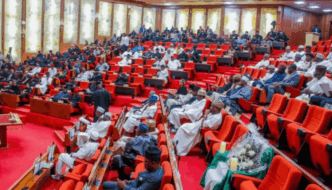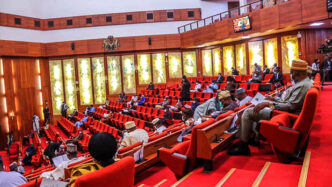FEDERAL INLAND REVENUE SERVICE V. CHECKPOINT SOFTWARE TECHNOLOGIES BV NIGERIA LIMITED
FEDERAL HIGH COURT NIGERIA
(FAJI; J)
FACTS
Checkpoint Software Technologies BV Nigeria Limited (“the Respondent”) was issued with Notices of Administrative Penalties by the Federal Inland Revenue Service (“the Appellant”) on 10 March 2022 and 15 March 2022 for late filing of its 2019 and 2020 Country-by-Country Notifications pursuant to the Country-by-Country Reporting Regulations 2018 (CbC). The Respondent, through letters dated 21 March 2022 and 22 March 2022, objected to the Notices and requested their withdrawal. The Appellant did not withdraw the Notices or provide a formal response addressing the matters raised in the objection. In its objection, the Respondent stated that the penalties issued were not supported by any valid statutory authority. It further noted that the CbC Regulations 2018 relied upon by the Appellant were linked to the OECD Country-by-Country Multilateral Competent Authority Agreement, which, according to the Respondent, had not been domesticated by the National Assembly at the time. The Respondent indicated that this situation raised concerns regarding the applicability, relevance, and enforceability of the regulatory framework in Nigeria, particularly where penalties or sanctions were sought to be imposed.
The Tax Appeal Tribunal reviewed the facts and documentation before it and concluded that the Notices of Administrative Penalties issued by the Appellant could not stand. The Tribunal accordingly set aside the Notices served on the Respondent. Following this decision, the Appellant expressed dissatisfaction and filed an appeal before the Federal High Court sitting in Lagos, seeking to overturn the ruling of the Tribunal. One of the issues formulated for determination in the appeal was: Whether the Country-by-Country Regulations is unconstitutional and void as a result of the non-domestication of the Multilateral Competent Authority on Country-by-Country Reporting?
ARGUMENTS
Learned counsel for the Appellant contends that the Income Tax Country-by-Country Reporting Regulations 2018 were validly enacted pursuant to the powers conferred on the Federal Inland Revenue Service (FIRS) under the Act establishing it and other relevant provisions of Nigeria’s tax laws. Counsel made specific reference to the Federal Government’s official gazette and argued that the Regulations were properly promulgated, received ministerial approval from the Honourable Minister of Finance, and were issued in accordance with constitutionally recognised procedures for delegated legislation. Counsel argued that the Regulations explicitly identify the enabling statutory framework that they are intended to operationalise, which includes key provisions of the tax laws in Nigeria. He submitted that the Regulations set out a legitimate and enforceable domestic reporting obligation whereby constituent entities of multinational enterprise (MNE) groups operating in Nigeria are required to file annual CbC reports in relation to their global operations, tax positions, and profit allocations, subject to administrative penalties in the event of failure to comply within the prescribed deadlines.
Counsel argued that Nigeria’s involvement in the international tax reform agenda championed under the G20/OECD Base Erosion and Profit Shifting (BEPS) Project, particularly Action 13 relating to transfer pricing transparency and her commitment to the automatic exchange of CbC reports is demonstrated by its ratification of the Convention on Mutual Administrative Assistance in Tax Matters (MAATM) in 2015 and its subsequent signing of the Multilateral Competent Authority Agreement (MCAA) in 2016. In the Appellant’s view, these actions reflect Nigeria’s proactive engagement in global tax cooperation. Learned counsel argued that the Regulations do not constitute an international treaty nor do they seek to enforce one. Rather, they operate as a purely domestic regulatory instrument derived from the FIRS’s statutory mandate to enhance tax compliance and improve revenue administration. Finally, he concluded by arguing that the Regulations are legally sound, constitutionally compliant, and fully enforceable in Nigeria without the need for further legislative intervention, stating that the Regulations are distinct from the MCAA and are not dependent upon its domestication for their enforceability, stating that they simply adopt and implement internationally recognised standards within Nigeria’s domestic legal framework, as permitted under the FIRS Act and other Nigerian tax legislation.
In response, counsel for the Respondent argues that the Regulations are fundamentally unconstitutional. According to the Respondent, the Regulations are drafted in a manner that mirrors the provisions of the MCAA, an international multilateral agreement designed to facilitate the automatic exchange of tax information among signatory jurisdictions. Counsel maintained that the Federal Executive Council’s approval of the MCAA is insufficient to give the agreement binding legal force in Nigeria. According to him, this is because the constitution requires that any international treaty or agreement must be ratified and domesticated in Nigeria by an Act of the National Assembly before it can take effect domestically.
Learned counsel submitted that the purpose of the Regulations is to implement obligations arising under the MCAA. However, a review of the Laws of the Federation of Nigeria reveals that there is currently no Ratification Act domesticated by the National Assembly in relation to the MCAA thus, the act of the Appellant in attempting to give domestic effect to an undomesticated treaty by relying on subordinate legislation is constitutionally impermissible. He maintained that the Respondent have acted ultra vires by exceeding the legislative authority conferred upon it under the enabling Act. Counsel finally submitted that delegated legislation cannot be used as a means of enforcing international obligations that lack legislative domestication. Since the Regulations are said to rely entirely on the MCAA, which remains unenforceable in Nigeria, learned counsel submits that the Regulations are null, void, and unconstitutional.
DECISION OF THE COURT
In resolving this issue, the Federal High Court held that:
The Country-by-Country Reporting Regulations are unconstitutional and void, having been made pursuant to the Multilateral Competent Authority Agreement (MCAA), an international instrument which has not been domesticated in Nigeria through an Act of the National Assembly. The Court held that the Regulations derive their legal force and operational purpose from the MCAA, a treaty executed between Nigeria and other jurisdictions for the automatic exchange of Country-by-Country Reports and the Constitution requires that any treaty or international agreement entered into by the Federal Government shall not have the force of law in Nigeria unless it has been ratified by an Act of the National Assembly. Consequently, without proper domestication, the MCAA remains unenforceable within Nigeria’s legal system, and any delegated legislation purporting to give it effect is ultra vires.
The Court further held that the Respondent lacked the legal authority to issue the Income Tax (Country-by-Country Reporting) Regulations 2018 in the absence of a duly constituted Board, as mandated under the Act, which expressly vests the power to make subsidiary legislation in the FIRS Board, subject to the approval of the Honourable Minister of Finance.
In the instant case, since the Regulations was based on a foreign instrument not yet domesticated in Nigeria and the Respondent had no active Board in place at the material time, the statutory conditions precedent for ratification and valid delegated legislation were not met. The Court therefore found that the Regulations were made without proper legal authorisation and, on that basis, are null, void, and incapable of generating enforceable obligations within Nigeria.
Issue resolved in favour of the Respondent.
Moses Ideho Esq for the Appellant.
O. Odbunmi Esq. for the Respondent.
This summary is fully reported at (2025) 11 CLRN in association with ALP NG & Co.
See www.clrndirect.com ; www.alp.company.









